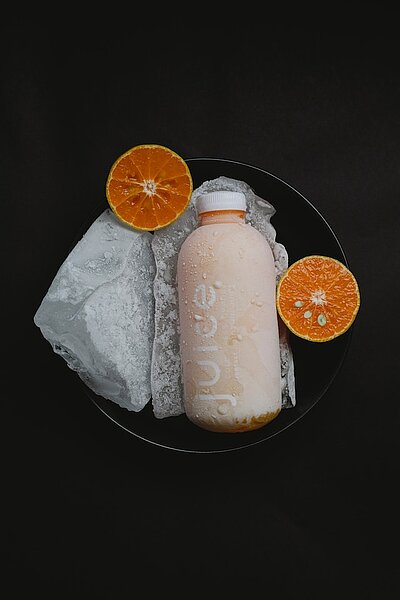Juice

What is juice?
Juice is a liquid that is squeezed or extracted from fruit or vegetables. There are many different types of juice, such as apple juice, orange juice, carrot juice or tomato juice. Juice can be drunk pure or diluted with water. Some juices also contain sugar or other additives.
What are the benefits of juice for dogs?
Juice can have several benefits for dogs, depending on which variety it is. For example, juice can be a source of vitamins, minerals and antioxidants that can support your dog's immune system and health. Juice can also help to meet your dog's hydration needs, especially if they don't drink much or in hot weather. Juice can also stimulate your dog's sense of taste and provide some variety.
What are the disadvantages of juice for dogs?
However, juice also has some disadvantages for dogs that you should be aware of. For example, juice can contain too much sugar, which can lead to obesity, tooth decay or diabetes. Juice can also contain too much acid, which can irritate your dog's gastrointestinal tract or attack tooth enamel. Juice can also trigger allergies or intolerances if your dog is sensitive to certain fruits or vegetables. Juice can also reduce your dog's appetite or distract them from their normal food.
What should you watch out for?when offering your dog juice?
If you want to offer your dog juice, there are a few things you should bear in mind:
- Choose a juice that does not contain sugar or other additives. It is best if you make the juice yourself from fresh fruit or vegetables or buy an organic juice.
- Only give your dog small amounts of juice and dilute it with water in a ratio of 1:4 to reduce calorie and sugar intake and aid digestion.
- Only offer your dog juice that is suitable for him. Avoid juices made from citrus fruits such as oranges or grapefruits as they are too acidic. Also avoid juices made from grapes or raisins as they are toxic to dogs. Also avoid juices made from garlic or onions as they can lead to anemia.
- Observe your dog's reaction to the juice. If he shows diarrhea, vomiting or other symptoms, you should stop the juice immediately.
- Do not replace your dog's normal water or food with juice. Juice should only be a supplement and not your dog's main source of fluids or nutrients.
Juice can have both advantages and disadvantages for dogs. If you want to offer your dog some juice from time to time, you should follow the tips above and always pay attention to your dog's health and well-being.
If you notice any signs of hypersensitivity or poisoning in your dog, you should see your vet immediately. We are not a substitute for a vet, but we try to be as accurate as possible. Every dog reacts differently and we recommend you get a second opinion or consult your vet if in doubt.
Stay healthy and take good care of your four-legged friend!😊